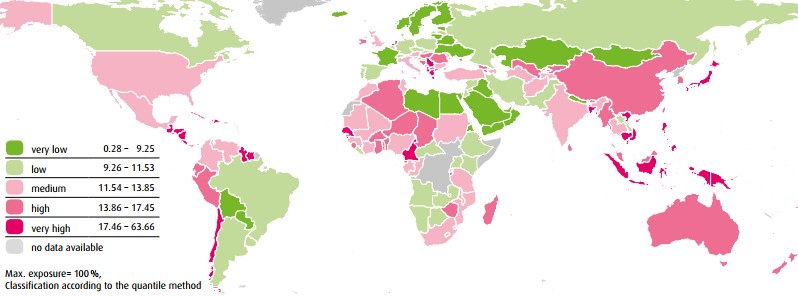World Risk Report 2017: marked increase in extreme weather events, but people more prepared

The vulnerability of countries worldwide to extreme natural events has declined this year, according to this year's World Risk Report, an alliance of German aid agencies. However, there has been a marked increase in extreme weather events such as storms and heavy rain. This has once again been demonstrated by both the hurricanes in the Caribbean and the severe storms in Germany.
On average, people are better prepared for natural hazards such as cyclones or earthquakes than they were five years ago. This is the outcome of a five-year analysis of the WorldRiskIndex.
The WorldRiskIndex states the risk of an extreme natural event leading to a disaster in 171 countries. The five-year-analysis shows that the disaster risk global hotspots are in Central America, West and Central Africa, Southeast Asia and Oceania.
In a comparison of world regions, the disaster risk is at its highest in Oceania and at its lowest in Europe. "On a global scale, vulnerability to extreme natural hazards has declined. Many countries have learned from previous disasters and are improving disaster preparedness," says Peter Mucke, WorldRiskReport Project Director and Managing Director of Bündnis Entwicklung Hilft.
However, warning against false optimism, Mucke adds: "There has been a marked increase in extreme weather events such as storms and heavy rain. This has once again been demonstrated by both the hurricanes in the Caribbean and the severe storms in Germany. And extremes in climate such as prolonged drought are expected to occur more frequently in the future."
Less vulnerability could be offset by higher exposure to natural hazards. Binding commitments to mitigate the consequences of climate change, as well as progress in development cooperation and disaster preparedness, are therefore indispensable.
The report identifies that there are many options to lessen risk particularly in the tropical, developing coastal nations that are the most at risk including ecosystem-based options. "Mangroves can reduce flood risks to people and property by 25% every year," said Dr. Michael Beck, Lead Marine Scientist for The Nature Conservancy.
.jpg)
Susceptibility – dependent on public infrastructure, nutrition, income and the general economic framework
.jpg)
Lack of coping capacities – dependent on governance, medical care and material security

Lack of adaptive capacities – related to future natural events and climate change

Exposure – Exposure of the population to the natural hazards earthquakes, storms, floods, droughts and sea level rise.

Vulnerability – Exposure of the population to the natural hazards earthquakes, storms, floods, droughts and sea level rise

WorldRiskIndex – WorldRiskIndex as the result of exposure and vulnerability
Since 2011, the WorldRiskReport has been published annually by Bündnis Entwicklung Hilft, and the WorldRiskIndex it contains was developed together with the Institute for Environment and Human Security of the United Nations University (UNU-EHS).
Featured image credit: World Risk Report

Commenting rules and guidelines
We value the thoughts and opinions of our readers and welcome healthy discussions on our website. In order to maintain a respectful and positive community, we ask that all commenters follow these rules:
We reserve the right to remove any comments that violate these rules. By commenting on our website, you agree to abide by these guidelines. Thank you for helping to create a positive and welcoming environment for all.